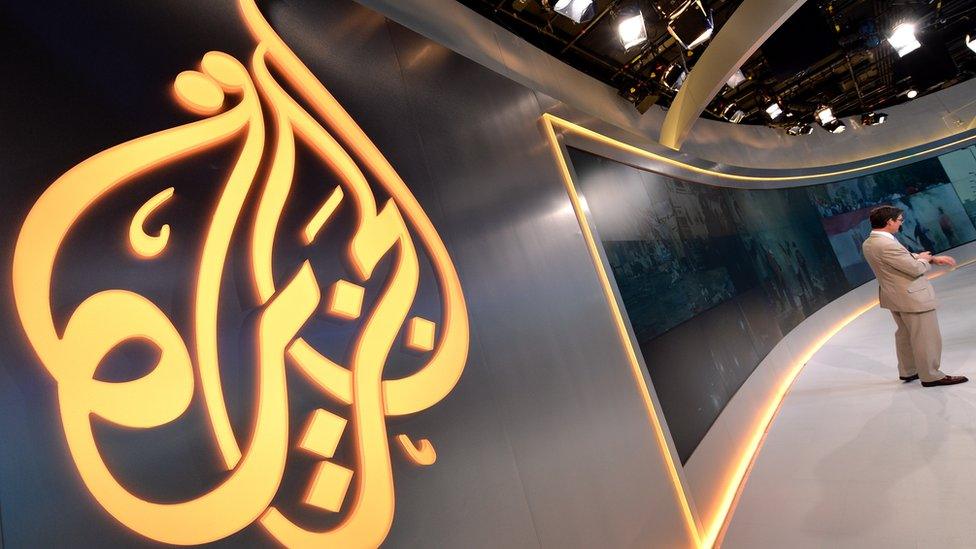Qatar hacking row fuels Gulf tensions
- Published

Qatari-funded Al Jazeera has been blocked by other Arab countries
Four Arab countries have blocked Qatari news websites following controversial comments attributed to the Qatari emir Sheikh Tamim bin Hamad Al Thani.
The website of the influential Al Jazeera network is among those now blocked by Saudi Arabia, United Arab Emirates, Egypt and Bahrain.
Qatar says the comments attributed to Sheikh Tamim were fake and appeared after hackers took control of the state news agency website.
Online users in the four countries have confirmed they could not access the websites.
Praising Iran
The disputed statement touched on many sensitive regional issues, but above all, praised Saudi Arabia's arch-rival Iran and carried thinly-veiled criticism of the kingdom.
In the report, Sheikh Tamim was quoted as saying: "There is no reason behind Arabs' hostility to Iran and our [Doha's] relationship with Israel is good."
The statement also had favourable words about the Lebanese Shia militant movement Hezbollah, a close ally of Iran.
Saudi media continued to report the comments even after Qatar said they had been "fabricated".
Qatari Foreign Minister Mohammed bin Abdulrahman Al Thani said his country will sue the perpetrators of the hacking attack, and described the incident as part of a "media campaign" against his country.
Pan-Arab Sky News Arabia TV has aired video footage apparently taken from Qatari TV in which the controversial comments appeared in a screen caption.
Regional tensions
The incident comes after participants at Sunday's Arab-Islamic-US summit in Riyadh unleashed a wave of condemnation of Shia-led Iran, blaming it for spreading terrorism and criticising its interference in the region.
Sunni-ruled Bahrain is currently facing internal unrest among its majority Shia population. It has banned Wefaq, the main Shia opposition group in the country, and stripped top cleric Isa Qassim of his Bahraini nationality, prompting protests and violence.
The "comments" attributed to Sheikh Tamim praised Iran and Israel
Tensions between Qatar and other Arab states came to the fore following the ousting of Egyptian Islamist President Mohammed Morsi by the army in July 2013.
Official media outlets in several Gulf States have repeatedly expressed dissatisfaction with Qatar's alleged support of the Egyptian Muslim Brotherhood (MB) group - of which Morsi was a member - and Hezbollah, which some Arab countries designate as terrorist organisations.
In March 2014, Saudi Arabia, Bahrain and the UAE withdrew their ambassadors from Qatar in protest over Doha's alleged interference in their affairs.
Announcing the ban this week, Egypt accused Al Jazeera of "inciting terrorism" and "fabricating news".
'Tool of Qatar'
Qatar's financial clout and regional influence brought about by the popularity of Al Jazeera have long been of concern to Gulf neighbours.
Saudi Arabia, historically the uncontested leader of the six-nation Gulf Cooperation Council, has sponsored several agreements with the Qatari government to rein in its media arms.
The coverage of the Doha-based pan-Arab network shows some inclination towards Islamists in Egypt and describes the ousting of Morsi by the military as a "coup".
Egyptian security officials have also cracked down on Al Jazeera journalists working in Egypt.
The channel is the most widely watched in the Arab world and portrays itself as a fearless bastion of objective journalism.
However critics say it is a tool of Qatari foreign policy and will rarely challenge the interests of its backers.
“óĻó“«Ć½ Monitoring reports and analyses news from TV, radio, web and print media around the world. You can follow “óĻó“«Ć½ Monitoring on and .